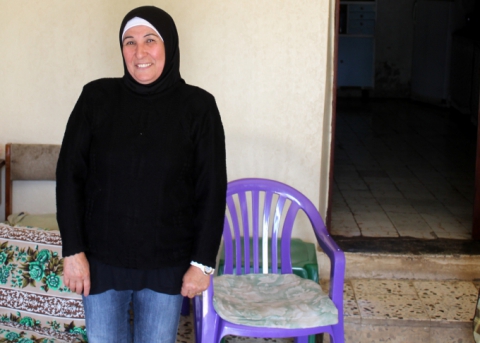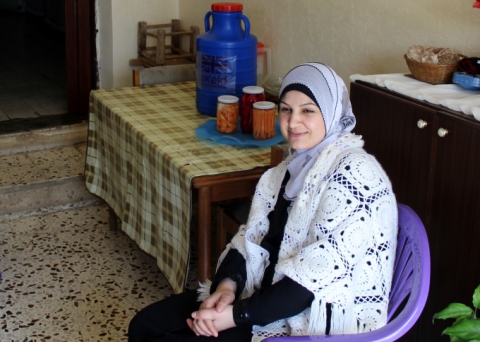The True Meaning of Fruitful Efforts

To go from watching your days pass by without any noticeable progress to being able to run your own enterprise must feel like a remarkable achievement.
And this is how Rihab and Nour look back at the last two weeks. A Syrian mother teamed up with her Lebanese neighbour to produce pickled vegetables and fruits, as part of Save the Children’s Home-Based Skills Development programme in a small town in the city of Akkar, North Lebanon.
‘’We sold out almost everything we produced- around 25 kg of pickled products,’’ said Nour, with a broad smile and triumphant voice.
‘’We packed ten jars in totall, only three are left. People liked what we did. They say pickles taste better.’’
‘’We started marketing through word of mouth,’’ added Rihab, pointing to three jars and a big blue container on the table.
‘’Each buyer would tell relatives and friends, and they would come asking about what we have. When they learn about the immaculate process and good quality, they ask for more products.’’
Through this programme, implemented by the Food Security and Livelihood division across several villages in Akkar, Save the Children aims to help community members generate a new source of income and devote their time to do something meaningful that would improve children's lives.
The two ladies were provided with tools and equipment to make their own fresh produce. Training on the right pickling methods was given to over 100 women identified in the project.
‘’What we always followed were old, traditional methods,‘’ revealed Nour.
‘’When Save the Children told us about efficient and healthy ways, we could see the difference. We bought vegetables and were provided with all the tools; gloves, aprons and pots. People started mixing together”.

For mother-of-three Rihab, pickling was a process she was happy to share with her family and friends.
‘’We learned that pickling has to follow specific, healthy methods that we weren’t aware of. You have to boil and sterilise water and jars. Then you make sure the containers are completely dry before the filling. You then add water, salt and vinegar before boiling components over again.
The social objective of the project also seems to have been realised. According to the two, the whole activity helped soothe any tensions among two societies. Working in groups, the Lebanese and Syrian women shared the joy and passion of learning and producing together, something they dub ‘’spirit of mingling’’.
‘’People started mixing together,’’ enthused Nour. Her cheerful tone still very much apparent in her words.
‘’Syrian and Lebanese women mingled and worked in teams. It certainly helped create a spirit of cooperation among those involved.’’
On the other end of the spectrum lies the financial aspect. Since the aim of the programme was to give women the chance to do something they enjoy, it was an equally-significant goal to help them improve their welfare conditions.

‘’I took part in this programme for two purposes; learning something new and useful, and helping my ill husband in generating some income,’’ shared Rihab, her eyes turned to the window.
‘’I have three kids who go to school, so it would be great to invest in my time and make this source more sustainable.’’
For Nour, meanwhile, it is about helping her father and spending time doing something useful.
‘’I live with my father. I had nothing to do throughout the day,’’ she said.
‘’I made good use of time, I found something to do. I felt productive and busy.’’
So what is next for the pair? New things. More learning, more producing. Maybe the expansion of a worthwhile plan. A bigger market- who knows.
‘’We are happy with the success of this small enterprise,’’ they stressed.
‘’We hope more opportunities will open up in the future. Maybe new horizons will open and the market gets bigger.
‘’We could start supplying restaurants, you never know.’’
One thing is sure- it is the dawn of something new and exciting for Nour and her neighbour Rihab.
 Lebanon
Lebanon